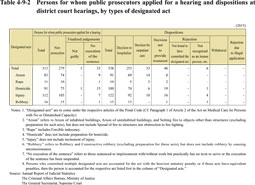Section 2 Medical Care and Treatment System for Mentally Ill
The medical care and treatment system for the mentally ill aims to improve the mental condition of persons who have committed a serious harmful act with no or diminished capacity, to prevent the recurrence of such acts and to facilitate their reintegration back into society by providing consistent and appropriate medical care and observations/instruction necessary to secure such medical care. The system was implemented in accordance with the Act on Medical Care and Treatment for Persons Who Have Caused Serious Incidents on the Grounds of Insanity or Diminished Capacity (hereinafter “Act on medical care for persons with no or diminished capacity,” Act No. 110 of 2003).
The medical care and treatment system covers [1] a person who has committed a designated act (homicide, arson, robbery, rape, forcible indecency, including an attempt of these offenses, or injury) but was not prosecuted as a conclusive disposition of a public prosecutor for the reason of insanity or diminished capacity at the time of the act, and [2] a person, either found not guilty on the ground of insanity or who received a mitigated sentence on the grounds of diminished capacity at the time of the designated act (excluding those sentenced to imprisonment and the execution of the sentence was not suspended) and the judgement has been finalized. A hearing for either [1] or [2] is initiated, in principle, upon an application by a public prosecutor. The hearing is to be held at a district court and heard by a panel consisting of a judge and a mental health expert (psychiatrist) to determine the necessity of medical treatment and if found necessary, the expected treatment.
Table 4-9-2 shows the number of persons for whom public prosecutors applied for a hearing and the number of persons whose cases were conclusively disposed of at the hearing by types of designated act.
Table 4-9-2 Persons for whom public prosecutors applied for a hearing and dispositions at district court hearings, by types of designated act
